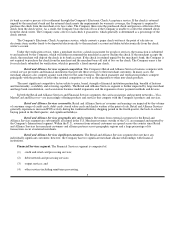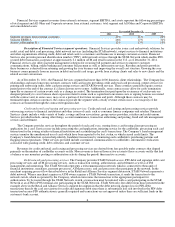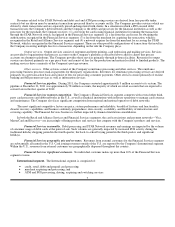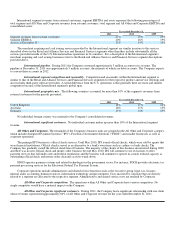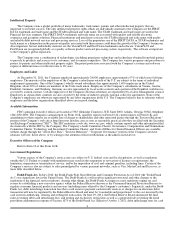First Data 2011 Annual Report Download - page 17
Download and view the complete annual report
Please find page 17 of the 2011 First Data annual report below. You can navigate through the pages in the report by either clicking on the pages listed below, or by using the keyword search tool below to find specific information within the annual report.
Material breaches in security of the Company's systems may have a significant effect on the Company's business.
The uninterrupted operation of the Company's information systems and the confidentiality of the customer/consumer
information that resides on such systems are critical to the successful operations of the Company's business. The Company has
security, backup and recovery systems in place, as well as a business continuity plan to ensure the system will not be inoperable. The
Company also has what it deems sufficient security around the system to prevent unauthorized access to the system. However, the
Company's visibility in the global payments industry may attract hackers to conduct attacks on the Company's systems that could
compromise the security of the Company's data. An information breach in the system and loss of confidential information such as
credit card numbers and related information could have a longer and more significant impact on the business operations than a
hardware failure. The loss of confidential information could result in losing the customers' confidence and thus the loss of their
business, as well as imposition of fines and damages.
The Company's debt agreements contain restrictions that will limit the Company's flexibility in operating its business.
The indentures governing the Company's senior secured notes, senior second lien notes, senior notes, PIK toggle senior second
lien notes, and senior subordinated notes; the indenture governing senior PIK notes of First Data Holdings Inc.; and the Company's
senior secured credit facilities contain various covenants that limit the Company's ability to engage in specified types of transactions.
These covenants limit the Company's and its restricted subsidiaries' ability to, among other things:
•incur additional indebtedness or issue certain preferred shares;
•pay dividends on, repurchase or make distributions in respect of the Company's capital stock or make other restricted
payments;
•make certain investments;
•sell certain assets;
•create liens;
•consolidate, merge, sell or otherwise dispose of all or substantially all of the Company's assets;
•enter into certain transactions with the Company's affiliates; and
•designate the Company's subsidiaries as unrestricted subsidiaries.
A breach of any of these covenants could result in a default under one or more of these agreements, including as a result of cross
default provisions and, in the case of the revolving credit facility, permit the lenders to cease making loans to the Company. Upon the
occurrence of an event of default under the Company's senior secured credit facilities, the lenders could elect to declare all amounts
outstanding under the Company's senior secured credit facilities to be immediately due and payable and terminate all commitments to
extend further credit. Such actions by those lenders could cause cross defaults under the Company's other indebtedness. If the
Company was unable to repay those amounts, the lenders under the Company's senior secured credit facilities could proceed against
the collateral granted to them to secure that indebtedness and the Company's secured and second lien notes. The Company has pledged
a significant portion of the Company's assets as collateral under the Company's senior secured credit facilities. If the lenders under the
senior secured credit facilities accelerate the repayment of borrowings, the Company may not have sufficient assets to repay the
Company's senior secured credit facilities and senior secured notes as well as the Company's second lien notes and unsecured
indebtedness.
The ability to adopt technology to changing industry and customer needs or trends may affect the Company's competitiveness or
demand for the Company's products, which may adversely affect the Company's operating results.
Changes in technology may limit the competitiveness of and demand for the Company's services. The Company's businesses
operate in industries that are subject to technological advancements, developing industry standards and changing customer needs and
preferences. Also, the Company's customers continue to adopt new technology for business and personal uses. The Company must
anticipate and respond to these industry and customer changes in order to remain competitive within the Company's relative markets.
For example, the ability to adopt technological advancements surrounding point-of-sale ("POS") technology available to merchants
could have an impact on the Company's International and Retail and Alliance Services business. The Company's inability to respond
to new competitors and technological advancements could impact all of the Company's businesses.
Changes in card association and debit network fees or products could increase costs or otherwise limit the Company's operations.
From time to time, card associations and debit networks increase the organization and/or processing fees (known as interchange
fees) that they charge. It is possible that competitive pressures will result in the Company absorbing a portion of such increases in the
future, which would increase its operating costs, reduce its profit margin and adversely affect its business, operating results and
financial condition. Furthermore, the rules and regulations of the various card associations and networks prescribe certain capital
requirements. Any increase in the capital level required would further limit the Company's use of capital for other purposes.
15


